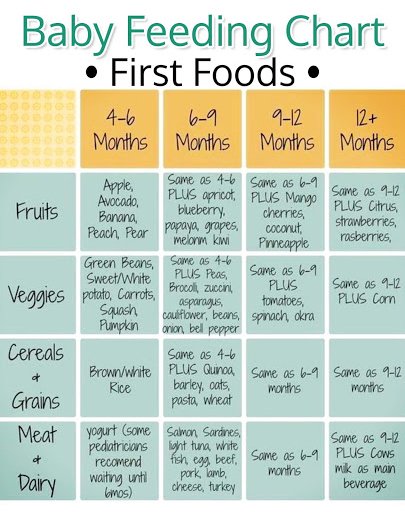Feeding fussy kids is a tough job. But introduce them to a variety of foods from a young age and you will have less trouble. When do you start introducing your babies to new foods? Which is the perfect time to wean? According to the World Health Organization, babies should be exclusively breastfed for up to 6 months, after which you may slowly introduce them to new foods. However, remember that the time it takes for a baby to be ready for solid foods differs.
Here are some of the Signs which State your Baby is Ready to have his First Solids
- When a baby has head control
- Sitting well with support
- Ability to convey when full like turning away his head
- Growing appetite, which can’t be satiated with breastfeeding even up to 8 times
- A sudden increase in weight
- Interest in food and eating people
Around the age of 4 months, your baby’s curiosity may increase and you begin to wonder if he is being fed enough. As long as his weight is within expected limits, do not worry about his milk intake.
Follow your instincts after carefully observing your baby if he is ready for solids.
How to Introduce Solid Foods to your Baby?
Follow these simple steps, and gradually get your baby habituated to solids step-by-step.
- Puree the vegetable, fruit or meat of your choice and keep ready. Give your infant just one or two teaspoons of the pureed food after his bottle feed or nursing.
- Use a smooth soft-tipped spoon and just add a bit to the tip of the spoon.
- Just let him taste it with the tip of his tongue and observe his willingness. If he lacks interest, try some other time and don’t force-feed.
- If you are feeding ready-made baby food, feed him a small quantity like a teaspoon in the diluted form. Make it runny initially and slowly thicken as he takes an interest in mashed solids.
- It takes time for your baby to get adjusted to the new taste, so don’t panic if he outright rejects what you feed.
- Introduce solids gradually one at a time. Let there be a difference of a week before you introduce another solid to check for allergic reactions.
- If your baby gets used to cereals, introduce new fruits, vegetables, and meat in a mushy form in the same meal as the cereal.
Babies take time to learn the art of keeping food in his mouth and following so let him practice.
What are the First Foods you can Introduce?
4-6 months
- Brown/white rice cereals
- Veggies you can try include mashed potato, sweet potatoes, pumpkin, carrots, butternut squash etc.(as cooked purees)
- Fruits include mashed banana, pear, avocado, peach, plum etc.(as cooked purees)
6-9 months
- Cereals like quinoa, barley, and oats can be introduced.
- Now fruits which are soft can just be mashed and hard fruits can be given as cooked purees. Mango, melon, papaya, tomatoes, raisins, citrus and kiwi fruits can be given.
- Vegetables which are cooked and pureed include beans, zucchini, peas, yellow squash, lentils, onions etc. Cooked egg and foods like chicken, fish, lamb, and beef can also be tried.
- Stuff like fish are highly allergic, so check carefully for reactions and feed with caution.
9-12 months
- Foods like cheese, flax seeds which are ground, bacon and ham can be slowly introduced.
Here’s a detailed chart on the foods you can introduce during different times

How to Check for Allergies?
If your child is allergic to any food, the reaction would begin showing up in a short while. Any reaction like hives, vomiting should be reported to a doctor. If you notice wheezing, facial swelling and gasping, call 911 immediately or your local emergency number.
Finally, some tips when introducing solids to help you make the transition with ease.
Tips to Remember when Introducing Solids
- Be patient and calm. Your baby will make a mess, spit out food and drive you crazy. Remember these are just passing days and he will love his solids soon.
- Get a high chair, safe cups, plate, and spoons, a bib, mats, and newspapers on the floor.
- Help your baby choose and negotiate. Let him smell, feel and select! Remember babies have taste preferences too!
- Eat with your baby so he understands the importance of eating together as a family right from the start.
- Avoid processed foods and packaged foods as much as possible.
- Go for a varying menu and a nutritionally balanced meal.
Remember, weaning your baby off breastfeeding or formula onto solid foods is an important phase which should be dealt with patience.

